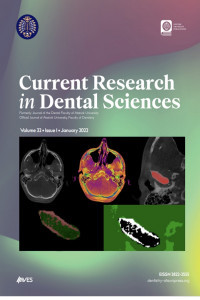FARKLI SIVILARIN AKRİLİK REZİNLERİN YÜZEY SERTLİKLERİNE ETKİSİNİN İNCELENMESİ
Amaç: Bu çalışmada, farklı sıvıların akrilik rezinlerin yüzey sertlik değişimlerine etkisinin incelenmesi amaçlanmıştır.Gereç ve Yöntem: Üç farklı akrilik rezinden hazırlanan 75 adet örnek rastgele beş gruba ayrılarak değişik sıvılarda yedi gün bekletildi. Daha sonra Vickers sertlik cihazı ile yüzey sertlik ölçümleri yapıldı. Elde edilen verilerin değerlendirilmesinde iki yönlü varyans analizi (ANOVA) kullanıldı.Bulgular: En fazla yüzey sertlik değeri (184.62 VHN) herhangi bir sıvıda bekletilmeyen ısı ile polimerize edilen akrilik rezin örneklerde, en az yüzey sertlik değeri ise (132.24 VHN) ağız gargarasında bekletilen otopolimerizan akrilik rezin örneklerde tespit edildi.Sonuç: Farklı sıvıların akrilik rezinlerin yüzey sertliğini istatistiksel olarak anlamlı derecede etkilemediği görüldü.Anahtar Kelimeler: Yüzey sertliği, farklı sıvılar, akrilik reziINVESTIGATION OF THE EFFECT OF DIFFERENT SOLUTIONS ON SURFACE HARDNESS OF ACRYLIC RESINABSTRACT Aim: The aim of this study was to investigate the effect of different solutions on surface hardness of acrylic resin.Material and Methods: 75 specimens were prepared from three different acrylic resins randomly divided into five groups and stored in different solutions for seven days. The surface hardness test was performed with Vickers hardness test machine. The statistically analysis of obtained data were performed by two-way analysis of variance test (ANOVA).Results: The result of two-way analysis of variance test showed that the highest Vickers Hardness value (184.62 VHN) was identified in control group for heat-curing acrylic resin, the lowest Vickers Hardness value (132.24 VHN) was identified stored in mouthwashes for self-curing acrylic resin.Conclusion: The different solutions were not statistically affect the surface hardness of denture base materials.Key Words: Surface hardness, different solutions, acrylic resin
